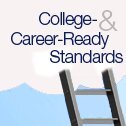More than half of the students in the country live in states that will not be using the PARCC and Smarter Balanced assessments this year.

As you can see from EdWeek’s updated chart below, 53 percent of students live in states that will be testing the common core—or whatever standards they chose—with tests designed for them, or purchased off the shelf. More than one-quarter of U.S. students live in states that will be using the Smarter Balanced assessment to gauge mastery of English/language arts and mathematics; 18 percent are in states using PARCC.
Only one state, Massachusetts, is in our “undecided” category, because in 2014-15 it is allowing districts to decide whether to use PARCC or its current test, the MCAS.

The last time EdWeek brought you this breakdown, in June, we could already see that most U.S. students would not be taking PARCC or Smarter Balanced. That was in large part because of our longer list of “undecided” states, however. There was still the possibility that if some of those states embraced PARCC or Smarter Balanced, the consortium tests could end up being taken by the majority of students in the country.
But that’s not what happened. All states but Massachusetts have now chosen their dance partners for this year. And with only Michigan (Smarter Balanced) and Louisiana (PARCC) choosing federally funded consortium tests, that leaves a bigger majority waltzing with other assessments.
For all the details on which test each state is using, check EdWeek’s recently updated interactive map of all the states’ testing plans (and that includes the District of Columbia).
When we posted this map yesterday, common-core advocates were quick to point out that having 29 states share two tests aligned to one set of standards was quite an accomplishment (if you happen to view commonality as an accomplishment, that is).
It’s a glass-half-full/glass-half-empty debate, of course; Others are more inclined to point out that “common” might have had a different meaning if more than 20 states hadn’t jumped ship and chosen other assessments.
